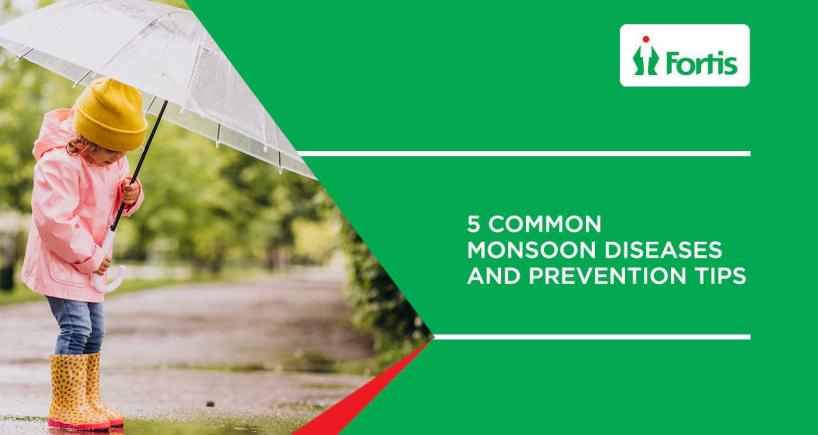
5 Common Monsoon Diseases and Prevention Tips
Monsoon is definitely a delightful season, providing much-needed respite from the scorching summer sun. However, the rainy season also brings with it a host of infections and health woes, ranging from an increased incidence of cough, cold and flu due to drastic temperature changes to viral fever and mosquito-borne diseases such as malaria, dengue, and chikungunya, etc. Doctors at Fortis Hospital, Mulund, list five of the most common monsoon-related diseases and what you can do to prevent or reduce your risk of getting sick this season.
Five common monsoon diseases to watch out for
Cold and Flu: The sudden change in temperatures during the monsoon season can increase your risk of common cold, cough and other viral infections like the flu. Both a common cold and the flu can cause similar symptoms such as a runny nose, sneezing, body aches, fever, general fatigues, etc. It may be noted that flu symptoms are generally more severe than cold symptoms. See a doctor if you have high fever or breathing difficulty.
Viral fever: Most common during monsoons, a viral fever is any fever that’s caused by a viral infection. It can cause a person to feel irritable, fatigued, achy. Other symptoms may include a runny nose, coughing, nausea, etc. While a viral fever usually goes away with time and supportive measures, you should seek medical help if you have a body temperature that is too high or one has continuous vomiting.
Dengue fever: The mosquito-borne tropical disease caused by the dengue virus can be very painful and life-threatening, often requiring care at a hospital. Symptoms typically last 2-7 days and can include a high fever, headache, nausea, vomiting, rash, muscle and joint aches. Most people with dengue recover after about a week. Visit a doctor if you have vomiting, dizziness & breathing difficulty.
Malaria: Another major health concern during the rainy season in India is malaria caused by a plasmodium parasite and transmitted by the bite of infected female Anopheles mosquitoes. Symptoms of malaria include fever, chills, headache, nausea and vomiting, abdominal pain, diarrhoea, muscle or joint pain, fatigue, rapid breathing, cough, general feeling of discomfort, etc. Seek immediate medical attention in case of experiencing severe symptoms.
Typhoid: An infection that spreads through contaminated food and water, typhoid fever can be fatal. This bacterial infection (caused by the bacteria Salmonella typhi) is more prevalent in areas where handwashing is less frequent. Signs and symptoms of typhoid fever include a high fever, headache, stomach pain, diarrhoea or constipation, weakness, etc. You must see a doctor immediately if you suspect you might have typhoid fever.
Read More: Dengue Shock Syndrome
Tips to stay away from various monsoon diseases
Here are a few tips to help you stay healthy during the monsoon:
- Eat a healthy, nutritious diet consisting of green vegetables and fruits that support a healthy immune system. Opt for fresh homemade food.
- Drink plenty of fluids (preferably boiled water).
- Maintain good hygiene and avoid touching face with unwashed hands.
- Wash your hands before eating any food.
- Keep your home and surroundings clean to get rid of mosquitoes.
- Use mosquito repellents and wear full sleeved clothes (if necessary).
- Getting vaccinated against typhoid fever is recommended before travelling to a high-risk area.
Additionally, avoid visiting crowded places to reduce your risk of viral infections.
Categories
Clear allMeet the doctor

- Internal Medicine | General Physician
-
16 Years
-
1500









